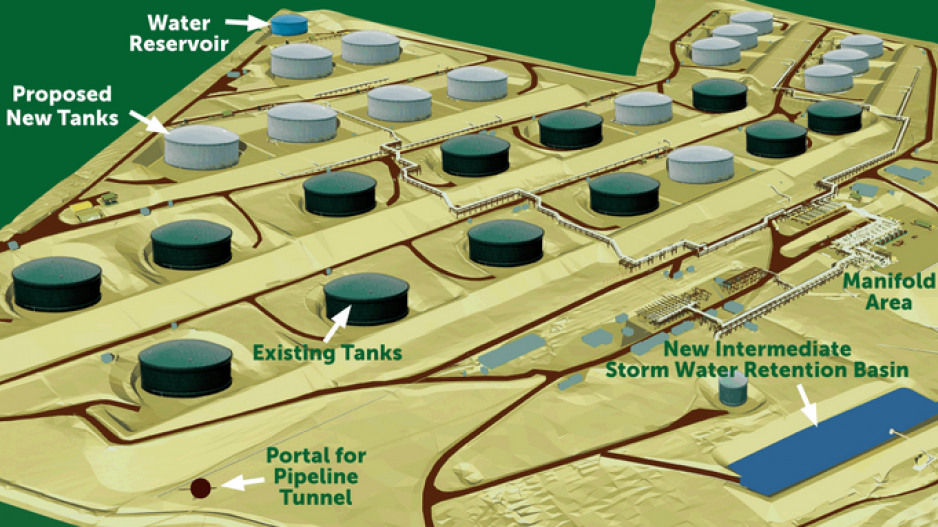Following approval by the National Energy Board (NEB) of changes in its expansion plans for its Burnaby, British Columbia terminal, Trans Mountain ULC will be able to begin construction at the terminal, subject to any other permits or authorizations which may be required.
In a decision released Friday, the board says the approval of the requested variance is in the public interest in that the changes will significantly improve safety, minimizing risk, at the terminal, the end point of the Trans Mountain pipeline system.
As part of the Trans Mountain expansion project, the company will build 14 new oil storage tanks at its tank farm at the Burnaby Terminal. On March 1, 2017, Trans Mountain had applied to the NEB to reduce the diameters of five of the 14 new tanks and the overall capacity of the facilities by 320,000 bbls. The company will also increase the amount of space between the tanks and reconfigure the secondary containment system at the tank farm in order to reduce the risk of fire.
In a letter to Trans Mountain, the NEB also noted that the company has proposed several design changes to the secondary containment system for the expanded Burnaby Terminal, including minimizing shared secondary containment areas and the addition of an interconnected spill containment system for spill management within the terminal property boundary.
The updated secondary containment design reduces fire risks and is capable of controlling and containing a multiple tank release within the property boundary through the interconnected spill containment system, said the board.
The NEB also released two letter reports stating that Trans Mountain has fulfilled Conditions 22 and 24 and Condition 9 of its approval. Conditions 22 and 24 cover updated risk assessments and secondary containment at the Burnaby terminal while Condition 9 is related to the company’s Quality Management Plan as it applies to the entire project. As the changes apply to an order granted under section 58 of the NEB Act, the NEB is the final decision-maker.
The NEB had asked for comments on the variance application from any interested person or group. The NEB received comments from the City of Burnaby which asked it to delay approval until after the Condition 22 and 24 reports are finalized in consultation with Burnaby. However, the NEB accepted Trans Mountain’s response that emergency response planning is informed in part by the final design of the expanded terminal and if it were to proceed with such planning in advance of approval of the final design, those measures might not be adequate in responding to the potential hazards associated with the operation of the expanded terminal.
The board also reminded Trans Mountain that under Condition 127 it must file an independent third party report that confirms the adequacy of the proposed fire protection and firefighting systems. The report must demonstrate, with respect to the Burnaby Terminal that the resources and firefighting systems are capable of suppressing fires associated with all scenarios identified in the terminal’s final risk assessment required by Condition 129.
In its filing, the City of Burnaby indicated that it had concerns with respect to engagement with Trans Mountain with respect to the expansion project and the application. In response, Trans Mountain indicated that it had made repeated attempts to engage with the City of Burnaby in relation to the application, condition compliance, and emergency response.
The board in its letter noted Trans Mountain’s commitment to continued engagement with the City of Burnaby, as well as local stakeholders. In the board’s view, consultation and communication between Trans Mountain and local governments, emergency response organizations and first responders is necessary for emergency response to be effective.
“Numerous conditions imposed on Trans Mountain through the various regulatory instruments issued for the TMEP, including some related to emergency management, are still outstanding or ongoing and involve consultation with affected parties, including municipalities, to hear concerns and to discuss potential solutions,” said the NEB. The board said it expects Trans Mountain to continue its engagement for the expansion project and provide opportunities for the City of Burnaby and other affected stakeholders.
It also “encourages affected stakeholders to undertake genuine consultation, regardless of their views about the application or the broader TMEP.”
Although Trans Mountain may now begin work at the Burnaby Terminal, the NEB is still assessing condition compliance and the company is not yet authorized to begin building the pipeline itself.




